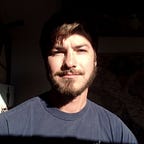Re-imagining the California Dream
“Oh! God, may it please thee, in thy divine providence, to still guide and protect us through this wilderness of doubt and fear, as thou hast done heretofore, and be with us in the hour of danger and difficulty, as all praise is due to thee and not to man, oh! do not forsake us Lord, but be with us and direct us through.”
— Harrison G. Rogers, Clerk to Jedediah Smith
It’s a shame that there are no feature films about Jedediah Smith — the first explorer to make the overland journey across the rugged American frontier to California. I never heard Smith’s story in grade school, and you’ve probably never heard of him either.
Yet in any history of California worth its salt, Smith appears as a larger-than-life genuine hero. It’s a refreshing, albeit tragic tale in an era when most real-life hero’s journeys have to be either whitewashed or contradicted by political correctness.
From losing his scalp in a brawl with a Grizzly, to losing his life to Comanche arrows, Jedediah Smith’s dramatic life and death in the American West presents a true story that was made for the silver screen. So why hasn’t Hollywood taken the bait?
The Californian imagination as it stands was mostly inspired by writers, thinkers, and theologians… poets and prophets… utopian dreamers, schemers, outright sinners, and the occasional saint. The common thread tying these foundational figures together was a fundamentally religious disposition that comforted them when they were lost in the wilderness, stranded at sea, or rebuilding out the ashes in a desolate place.
For Catholic missionaries like Saint Junipero Serra, the connection to the prophetic type could be traced via apostolic succession all the way back, from Jerusalem to this far corner of the earth. Here on the west coast of a new continent, they were to baptize and then civilize the pagan natives. But for Protestant adventurers like Jedediah Smith, the calling was felt to be equally religious. Smith’s untimely demise prevented him from ever reading or hearing the words “Manifest Destiny”, but they were written on the expeditions themselves, and in his and his mens’ diaries. Harrison G. Rogers, Smith’s clerk, was killed in 1828 — massacred by Native Americans on Oregon’s Umpqua River — but not before pleading for divine intercession (apparently unsuccessfully) in his diary.
Later arrivals to the state, such as the sea-faring young Richard Henry Dana, also carried with them the mindset of an apostle — bearing the light of the Word to a people in darkness. Their orientation was thoroughly Protestant but perhaps even more thoroughly American — daring, hopeful, and a little grandiose.
Were the violent deaths of Jedediah Smith and Harrison Rogers a sign that their mission was misguided — that their version of the Gospel had lost its saltiness? Or was it an intimation of a great new pouring out of spirit and masculine energy into the western frontier that would result from their martyrdom? Kevin Starr — a worthy authority on all things Californian — blames many persistent problems in modern California on a kind of residual, unresolved Protestantism: a misguided zeal to tame California for the glory of God. In fact, for Starr, this careless zeal is nearly one and the same with California’s original sin. Men like Charles Fremont filibustered their way into positions of power in the newborn state after fomenting a violent revolution and wresting it from Mexican control, even though it was already clear by 1848 that California would eventually be subsumed into the growing Union.
In his magisterial Americans and the California Dream Starr posits that this break from the past and bursting forth of American vigor could have been achieved without bloodshed. And perhaps it would have, if a man of Jedediah Smith’s character and stature had survived his ambush and lived to reign in the excessive conquering zeal of his American brethren. Smith, a Methodist, would have been considered progressive in his time. He sought friendly relations with Native Americans throughout his expeditions, and by all accounts as a good man — not given to profanity or strong drink.
We need more heroes, and as far as California’s founding fathers go, Smith is hard to beat. If there are any screenwriters reading this, they might consider a re-imagining of Smith’s pioneering of the overland route as an action-packed prelude to the Gold Rush era that followed. It’s got all the makings of a blockbuster – good guys, bad guys, shootouts, dashed hopes, stunning vistas, and even a vicious CGI Grizzly bear to appeal to the kids. That’s a film I’d take the whole family to see.
